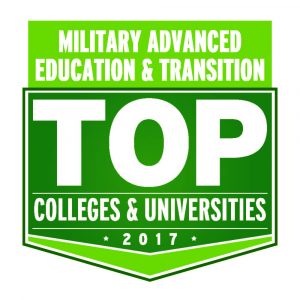 Military Advanced Education & Transition (MAE&T) has awarded Central Lakes College the designation of a Top School in its 2017 Guide to Colleges & Universities, measuring best practices in military and veteran education. The Guide is to be released this December, and will be available online at www.mae-kmi.com.
Military Advanced Education & Transition (MAE&T) has awarded Central Lakes College the designation of a Top School in its 2017 Guide to Colleges & Universities, measuring best practices in military and veteran education. The Guide is to be released this December, and will be available online at www.mae-kmi.com.
The Guide presents results of a questionnaire of the military-supportive policies enacted at hundreds of institutions including private, public, for-profit, not-for-profit, four-year, and two-year colleges. From community colleges to state universities, online universities and nationally known centers of higher learning, MAE&T’s 2017 Guide to Colleges & Universities arms students with information about institutions that go out of their way to give back to our men and women in uniform.
The Military Advanced Education and Transition Guide profiles a higher education institution on its military culture, financial assistance programs, flexibility and support, both online and on-campus,” said Jane Birkholz, Dean of Student Success at CLC. “We at Central Lakes College are proud to be recognized as a top school in the 2017 Military Advanced Education Transition Guide. This honor attests to our campus-wide commitment to our military veterans and their families and our continuing investment in their success.”
Now in its 10th year of publishing the Guide, MAE&T was the first publication to launch a reference tool of this type. This year, institutes were evaluated on their military culture, financial aid, flexibility, general support, on-campus support and online support services. Each school’s performance rating by category is represented by an easy-to-recognize dashboard. This enables prospective students to quickly target schools that follow best practices in military education, and then put these in context with other academic or career considerations.
“MAE&T’s Guide to Colleges and Universities provides the foundational information a prospective student would use in framing his or her educational needs,” said Kelly Fodel, Military Advanced Education & Transition’s editor-in-chief. “We want to be a dynamic resource for those looking to further their educations and careers. A key part of that is finding the right school, and it can be a confusing process for military members to navigate.”
The 2017 Guide is printed in the December issue of Military Advanced Education & Transition, and is also published in a searchable database online. Students have access to all the survey questions and answers provided by the schools, as well as explanations about critical issues like activation and deployment policies, withdrawal policies, scholarship and financial aid information and important support information.
“There are many different variables by which you could evaluate an institution, but we focus on the best practices that have been asserted by various higher education groups and reinforced by veteran groups. These best practices assure students that they have a high chance of success and support at their school of choice,” said Fodel. “That’s we consider our survey to be the most detailed and informative in the industry.”
Visit www.mae-kmi.com for online access to MAE&T’s 2017 Guide to Colleges and Universities, or pick up a copy of the December issue of Military Advanced Education & Transition.
About Military Advanced Education & Transition:
Military Advanced Education & Transition (www.mae-kmi.com) is the journal of higher education for service members and veterans making the transition from military to the civilian sector.
Covering issues and hot topics in higher education, career trends, transition assistance, innovative programs, and schools of special interest to the military, MAE&T focuses on news and resources that will empower a military student to pursue a quality education and rewarding career. MAE&T serves education services officers (ESOs) and transition officers (TOs) at every U.S. military installation, along with the service members they counsel. Published 10 times yearly, MAE&T’s editorial coverage includes exclusive interviews with military executive leadership, educators, and members of Congress; best practices; career and transition spotlights, service member, school, and program profiles, and periodic special reports.
 CLC News The news and events from Central Lakes College
CLC News The news and events from Central Lakes College


